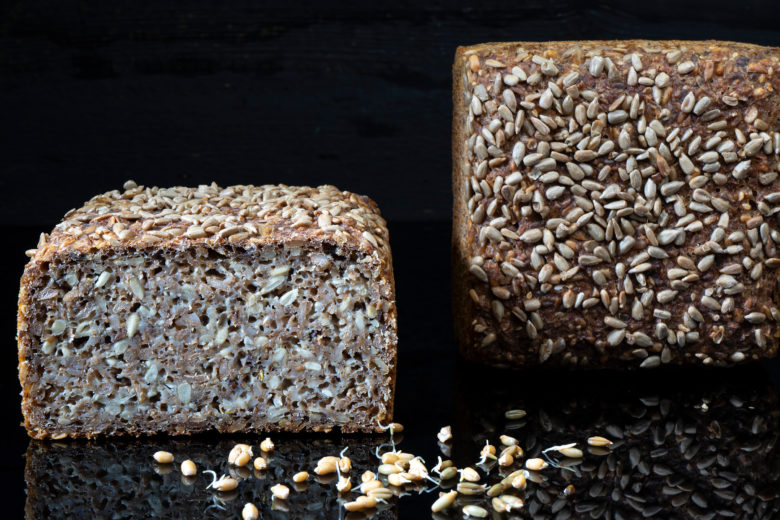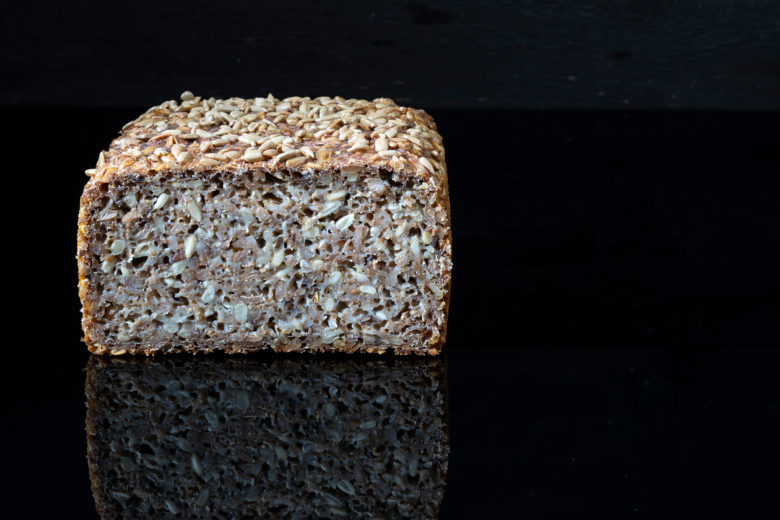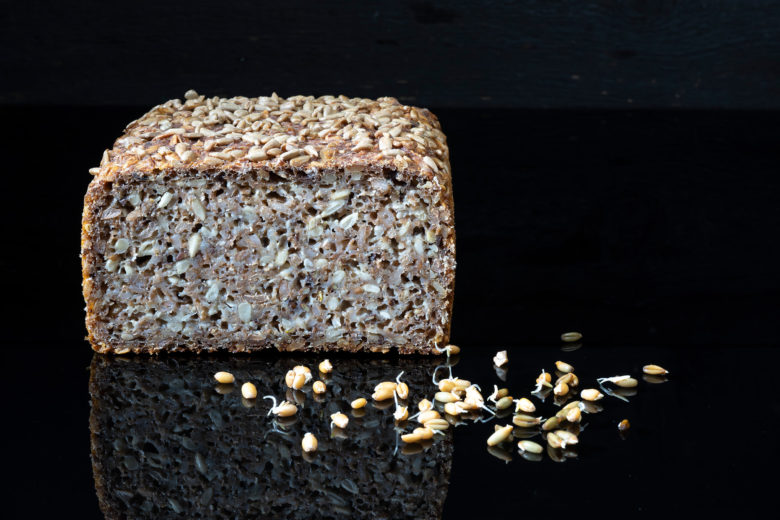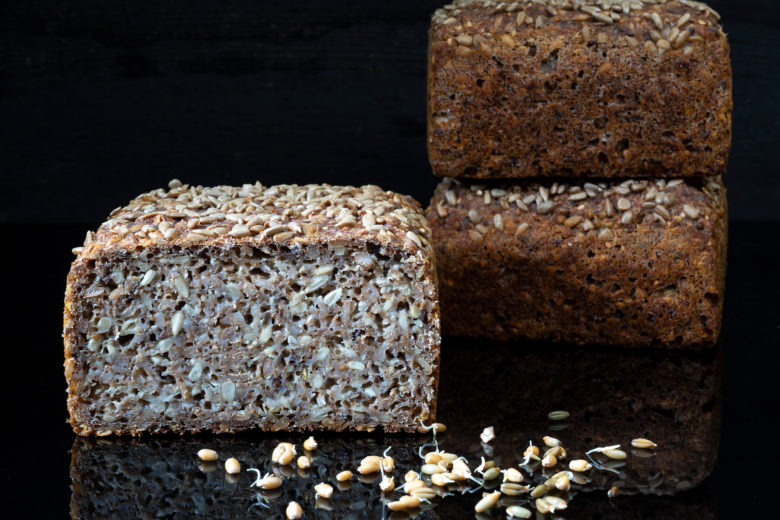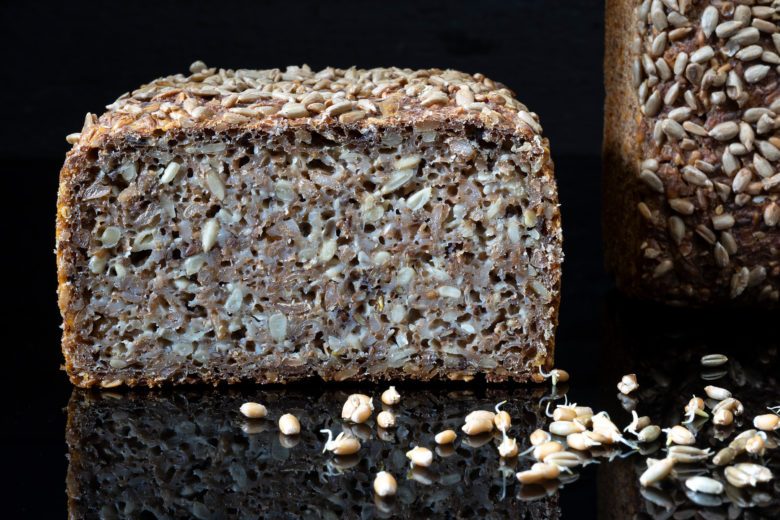Sprouted Grain Bread – Spelt Sprout
Sprouted grains have a long tradition in the culinary field (eg. in brewing and malt production,..) and they also have a place in the bakery. Sprouted grain breads provide an additional flavor profile in bread offerings and they also offer especially good nutrition.
The production of sprouted grain requires attention to a number of important factors such as humidity, time (germination time) and the temperature. These parameters influence and control the germination process of the grain at the same time.
The most important factors at a glance:
- Soaking: The grains are first washed and then soaked in water.
- Fill level: When using large tubs, a fill level of 15cm is aimed for- with a higher density of filling there is a risk that the temperature will rise too much in the germinations process. When making them at home, the glass or container should not be filled more than 60%- there is a large volume increase in the sprouting process!!
- Temperature: Constant temperatures lead to a more even sprouting. 15°C is optimal.
- Rinsing and washing: During the sprouting process, the sprouts are repeatedly washed with water. This process prevents them from drying out and aids in regulating the temperature of the sprouts.
- Time: The longer the germination time, the more starch is broken down.
The following rule of thumb is applied when preparing sprouts in larger tubs: “15cm fill level, 15°C and 30 hours of germination”
Soaking
First, the grain is washed and checked for any contamination or broken grains! Then the grain is completely covered with cold water and soaked at approx. 15°C for 12 hours. If the place is too warm (eg. window sill, …) there is a risk of extraneous fermentation!
Various sprouting jars are useful, only cost a very Euros, taken up very little space and simply the process, e.g.: Sprouting container
Germination
After the 12 hours soaking phase, the water is drained, the grains are rinsed with clean water and then left to germinate. To prevent the grains from drying out they need to be rinsed frequently (about every 4-6 hours) with cold water. It should be ensured that the grains don’t dry out.
Guidelines:
- Rye, Barley and Oats: c. 30 hour germination time
- Wheat & Spelt: c. 36 hour germination time
Working with Sprouted Grains
- Working with whole sprouted grains: The use of whole sprouts has the advantage of a giving a nice look to the crumb but sprouts that are at or near the crust tend to dry out! These will be very hard to bite and chew- this can be remedied by baking in a closed tin and at lower and more mild temperatures.
- Sprouted grain flakes: A grain flaker also can help crush the grains. The thinner the grains are pressed, the higher the rise in the resulting dough.
- Sprouted grains minced in a meat grinder or food processor: Sprouted grains can be ground or minced in a meat grinder or food processor. My tip: Mix the water amount to be used in the main dough with the sprouts and process at high speed in the food processor (Thermomix)!
Storing sprouted grains:
Storing sprouted grains is limited by time and should only be done at refrigerator temperatures! Before storing, it is important to spread the grains out on a tray and cool them in the refrigerator at 4°C. Only cooled grains should be stored in a sealed container.
Sprouts can be stored in the deep freeze. In this case, first freeze the sprouts on a tray then they can be packaged and stored for several weeks at -15°C.
Drying: To dry sprouts there are 2 different methods- the difference lies in the drying temperature. If the temperature remains under 50°C, the enzymes remain active and at 90°C the enzymes are rendered inactive. The resulting dried sprouted grain product can be ground into either active or inactive malt.
INFO: Sprouted grains have a moisture content of 35-40%!
Recipe
For a dough weight of 1783g / 2 pieces, each 891g of dough
Total Recipe
| 500g | Sprouted spelt grains, finely ground/minced (c. 325g dried grains) | 45% |
| 200g | Sprouted spelt grains, whole (c. 130g dried grains) | 17,5% |
| 200g | Sprouted rye grains (c. 130g dried grains) | 17,5% |
| 120g | Spelt flour Type 630 | 11% |
| 100g | Spelt flakes | 9% |
| 200g | Toasted sunflower seeds | 17,5% |
| 520g | Water | 45% |
| 18g | Salt | 1,6% |
| 5g | Yeast | 0,4% |
Sprouted grain sourdough
| 200g | Sprouted rye grains (ground/minced in a meat grinder or food processor) |
| 120g | Water 35°C |
| 20g | Starter |
Process the rye sprouts and then mix with the water and starter! Then let it mature for 10-12 hours at 25-28°C. My tip: Process the water and sprouts in the Thermomix (food processor) at high speed and then mix with the starter!
Scald
| 350g | Water 100°C |
| 200g | Toasted sunflower seeds |
| 100g | Spelt flakes |
| 18g | Salt |
Mix together and let soak for 4-6 hours. Cover and let it stand at room temperature until ready to use.
Main dough
| 340g | Mature rye sourdough |
| 668g | Scald |
| 200g | Sprouted spelt, whole |
| 500g | Sprouted spelt, finely minced/ground |
| 120g | Spelt flour Type 630 |
| 50g | Water (hold back the water at first and only use if needed!!) |
| 5g | Yeast |
Production
- Slowly mix all of the ingredients for 5-7 minutes in the mixer. Only at water if needed- the dough consistency can be very soft since the dough is simply scooped into the form and isn’t shaped like normal!
- After making the dough let it rest for 30 minutes in the mixing bowl.
- Then fill it into a baking pan- this can be filled up to 70% (only a small volume increase is expected).
- Spritz the dough surface with water and sprinkle with sunflower seeds or spelt flakes as desired.
- Cover and let it proof.
- Once fully proofed, slide the bread into the oven at 220°C with strong steam. Reduce the baking temperature to 190°C. Release the steam after 6-7 minutes!
- Total baking time of about 90 minutes.


